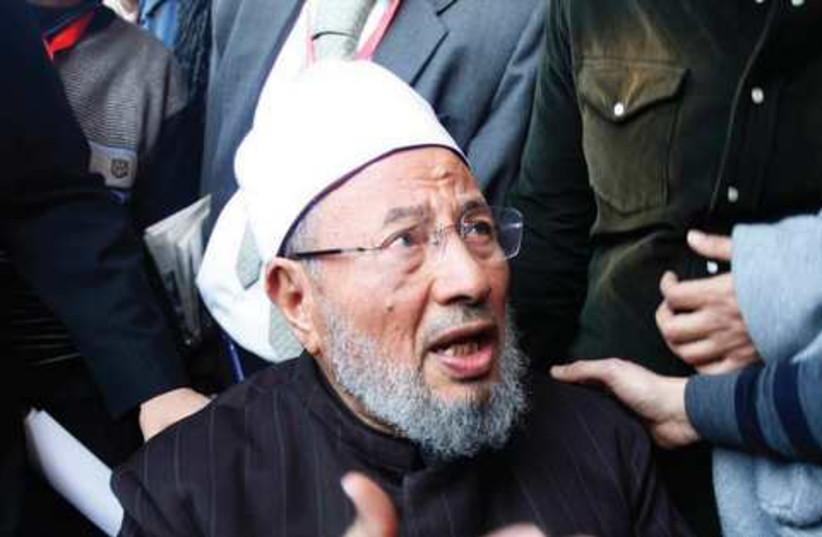Egyptian-born Sheikh Yusuf al-Qaradawi, viewed for decades as one of the senior scholars of Sunni Islam, died on September 26 at the age of 96.
According to a report by the Meir Amit Intelligence and Terrorism Information Center, Qaradawi’s story is a cautionary tale about how a radical Islamist can easily fool much of the West for an extended period of time by mixing in some reformist and modern-sounding views with his otherwise hateful rhetoric to obscure his darker side.
The report stated that by the 1960s, Qaradawi had moved the center of his activities to Qatar. There he established “a network of global Islamic organizations, including the Coalition of Good (I’tilaf al-Khayr), an economic wing of charity organizations that funneled funds from the entire world, including Europe, to the terrorist Hamas movement. “
Simultaneously, from 2004-2018, he ran the radical Islamic organization World Association of Muslim Scholars.
The Meir Amit Center report said, “Through this organization, he concentrated and coordinated the activity of radical Islamic scholars around the world, many of them members of the Muslim Brotherhood, but there were also members of other streams, some of them even more radical than the Muslim Brotherhood.”

Helping shape the concept of violent jihad
Many articles written about Qaradawi after his death emphasized his condemnation of al-Qaeda and ISIS and his moderate rulings permitting certain Western conduct for Muslims living as minorities in Western countries.
These articles portrayed him as many Westerners wanted to see him: a widely accepted authentic Islamic scholar who wanted to dialogue with the West and rejected violence.
However, the intelligence center noted that many of these articles left out that he helped shape “the concept of violent jihad,” especially justifying “carrying out terror attacks, including suicide bombing attacks, against Israeli citizens, the US forces in Iraq, and some of the Arab regimes.”
Qaradawi supported violent jihad and suicide bombing attacks against Israeli civilians. He was a source of supreme religious authority for Hamas at a time when many Islamic scholars still prohibited suicide of any kind.
Qaradawi claimed that violence was a legitimate expression of the so-called “resistance” and that Israel was a militaristic society in which every civilian is a potential soldier, said the report.
His antisemitism was not limited to Israel, with the report saying he frequently expressed antisemitic statements worldwide and even issued a fatwa authorizing attacks on Jews around the world.
In that fatwa, “he claimed that there is no essential difference between Judaism and Zionism, and therefore every Jewish target equals an Israeli target,” according to the report.
In an interview granted to Al Jazeera, he “claimed that Allah struck the Jews throughout history due to their corruption.... The last time it occurred was in the Holocaust, as punishment for the Jews’ corruption, and ‘the next time, with Allah’s help, it will happen at the hands of the [Muslim] believers.’”
At another point, he said, “The Jews opposed Muhammad, therefore Allah cursed them and turned them into apes and pigs.”
He also claimed that one should not make peace with the Jews “due to their negative qualities, as they appear in the Koran,” said the Meir Amit Center.
Despite decades of supporting radical causes and violence, Qaradawi was only banned from the US in 1999, from England in 2009, while many countries continued to value him as a so-called moderate.
However, the intelligence center said that in practice, all of his moderate rulings were a cover “to promote a radical Islamic agenda and gradually undermine Western democracy.”
Even regarding his opposition to al-Qaeda and ISIS, the intelligence center said, “It should be remembered that many of his students became supporters and even operatives of these organizations and his ideology concerning the religious laws of jihad (Fiqh al-Jihad) represented a milestone in shaping the concept of violent jihad of these organizations.”
His World Association of Muslim Scholars also published fatwas, such as blaming raped women for dressing immodestly, noted the report.
From 2013-2018, Egypt placed him on the INTERPOL list due to his affiliation with the Muslim Brotherhood, but in 2018 his name was “removed from the list without any explanation.”
In another game he played well for most of his career with the media and the West, he was often able to brush off radical accusations against the Muslim Brotherhood, saying that he had refused becoming a formal leader of the movement.
However, the report said, “It should be pointed out that he had always enjoyed a special status among the Muslim Brotherhood members and the international networks affiliated with the movement, serving as the prime source of Sharia [Islamic law] rulings for them.”
